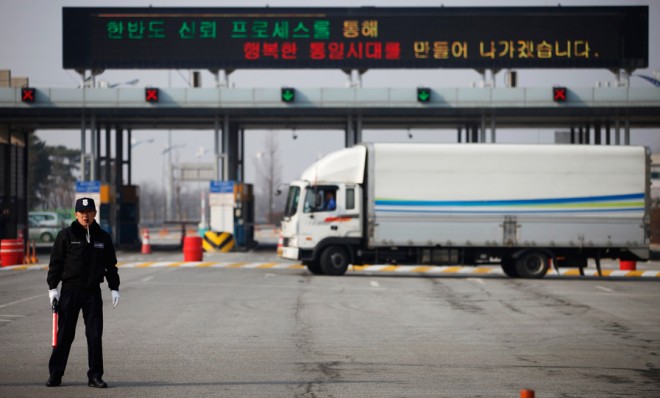Why North Korea cut its last economic tie to South Korea: 3 theories
The Hermit Kingdom's leaders need the money they make from the Kaesong industrial zone. Yet they're still shutting it down


A free daily email with the biggest news stories of the day – and the best features from TheWeek.com
You are now subscribed
Your newsletter sign-up was successful
North Korea announced Monday that it is pulling its 53,000 workers out of the Kaesong factory complex, which it operates with South Korea. Pyongyang said it was suspending operations in the industrial zone, which is just inside the North Korean side of the border, and contemplating closing it for good. The move severs, at least for now, the last economic link between the rival neighbors as tensions escalate over the North's controversial missile and nuclear programs. Meanwhile, analysts speculate that Pyongyang is getting ready to conduct its second nuclear test explosion of the year. Closing Kaesong will be costly for North Korea — the isolated communist nation struggles to keep its people from starving, and it earned $80 million from the $470 million worth of goods produced at the complex in 2012, according to South Korea's Ministry of Unification. What does Pyongyang hope to gain by closing the factory doors? Here, three theories:
1. North Korea is just trying to put more pressure on its enemies
"This is not the first time North Korea has threatened the future of the Kaesong industrial zone," says John Sudworth at BBC News. "But it is probably the most disruptive action taken in the factory complex's eight-year long existence." In past crises, North Korea has taken all kinds of drastic actions "to deliberately increase tension and then subsequently agreed to reduce it by undoing those actions for a price, economic or diplomatic." And, as cynics are pointing out, it hasn't committed to permanently closing the factories. "Given that Kaesong brings tens of millions of dollars of hard currency to the cash-strapped country, there may well yet be a reprieve somewhere down the line for this rather battered symbol of inter-Korean cooperation."
The Week
Escape your echo chamber. Get the facts behind the news, plus analysis from multiple perspectives.

Sign up for The Week's Free Newsletters
From our morning news briefing to a weekly Good News Newsletter, get the best of The Week delivered directly to your inbox.
From our morning news briefing to a weekly Good News Newsletter, get the best of The Week delivered directly to your inbox.
2. Pyongyang's war-mongering ways leave it with no choice
Yes, the Hermit Kingdom desperately needs the money it makes at the Kaesong complex. Still, Leonid Petrov, an expert on the North at Australian National University, tells Britain's Guardian, it's easy to understand why, as they declared themselves in a state of war against the South, the North couldn't very well go on jointly producing "sneakers and LCDs at the same time." Shutting down the factories, even if North Korea eventually reopens them, "is sending a strong message to prove that money means nothing for the regime and its nuclear missile programs are not for sale and not negotiable."
3. Suspending activity at the factory further isolates the North Korean people
Kaesong is not just a source of income for the regime of North Korean leader Kim Jong Un, says Steven Borowiec at The Christian Science Monitor. It also "has been a symbol of inter-Korean cooperation since it opened in 2004." The complex offers "one of the few connections to the outside world" for the Hermit Kingdom. "The North Koreans who work at Kaesong are the most likely to get the chance to interact with businessmen from South Korea." That makes the industrial zone a place where Kim's people can get "a rare look beyond their border," so closing the doors will help the regime make sure its people hear only what their leaders want them to hear as the regime rallies the population behind its call to arms.
A free daily email with the biggest news stories of the day – and the best features from TheWeek.com
Harold Maass is a contributing editor at The Week. He has been writing for The Week since the 2001 debut of the U.S. print edition and served as editor of TheWeek.com when it launched in 2008. Harold started his career as a newspaper reporter in South Florida and Haiti. He has previously worked for a variety of news outlets, including The Miami Herald, ABC News and Fox News, and for several years wrote a daily roundup of financial news for The Week and Yahoo Finance.
-
 Political cartoons for February 22
Political cartoons for February 22Cartoons Sunday’s political cartoons include Black history month, bloodsuckers, and more
-
 The mystery of flight MH370
The mystery of flight MH370The Explainer In 2014, the passenger plane vanished without trace. Twelve years on, a new operation is under way to find the wreckage of the doomed airliner
-
 5 royally funny cartoons about the former prince Andrew’s arrest
5 royally funny cartoons about the former prince Andrew’s arrestCartoons Artists take on falling from grace, kingly manners, and more
